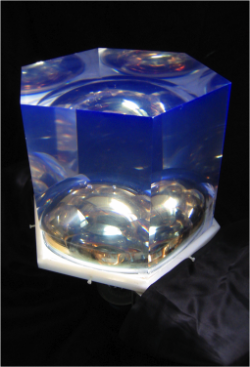UCL - University College London
Calorimeter for proton therapy and radiography
Trainee: Laurent Kelleter
Supervisor: Simon Jolly

A key challenge in proton therapy is the measurement of the proton energy in the treatment room. The precise knowledge of proton energy is required for many applications in proton therapy, e.g. in proton Computed Tomography (proton CT) which is hoped to significantly reduce treatment planning uncertainties. In addition, an accurate energy measurement would also provide valuable quality assurance (QA) measurements of the treatment protons.
This project sought to adapt existing technology for the precise measurement of proton energy in a clinical setting. A calorimeter based on plastic scintillator was developed by the UCL High Energy Physics group for the SuperNEMO experiment. Preliminary calculations and early experimental measurements indicate that such a SuperNEMO calorimeter achieves an energy resolution in the region of 1% for clinical proton energies. This formed the basis of the energy measurement stage for a proton CT system.
An advantage of the polystyrene scintillator is that it has a density similar to that of water. A system made of multiple stages of scintillator sheets and read out by a light sensor is able to directly measure the Water-Equivalent Path Length (WEPL) from the Bragg curve of the proton beam. The measurement of the proton range is crucial to ensure that the treatment is carried out safely. It is therefore part of a range of quality assurance procedures that are carried out each day before treatment starts. These range QA measurements take significant time to set up and adjust for different energies. The detector under development will also be used as the basis for a fast range QA system. This would allow several proton energy steps to be measured across the full energy range available at the nozzle within the time of delivery, significantly reducing the time taken to carry out the daily QA.
Image courtesy of UCL